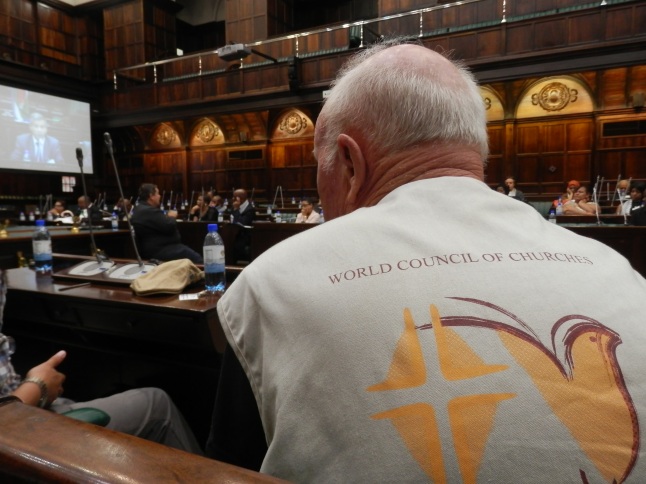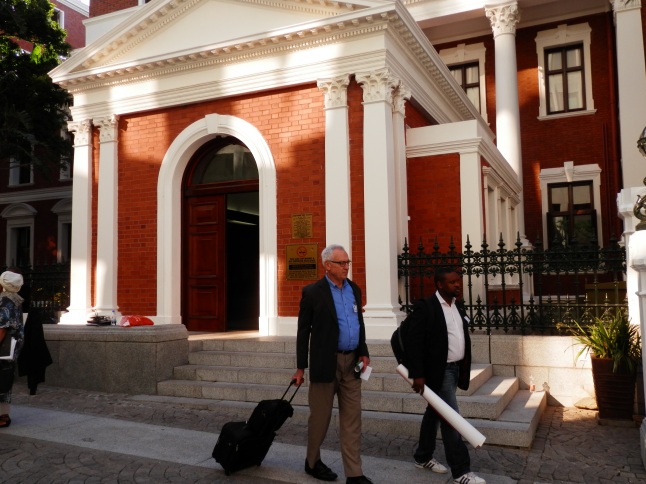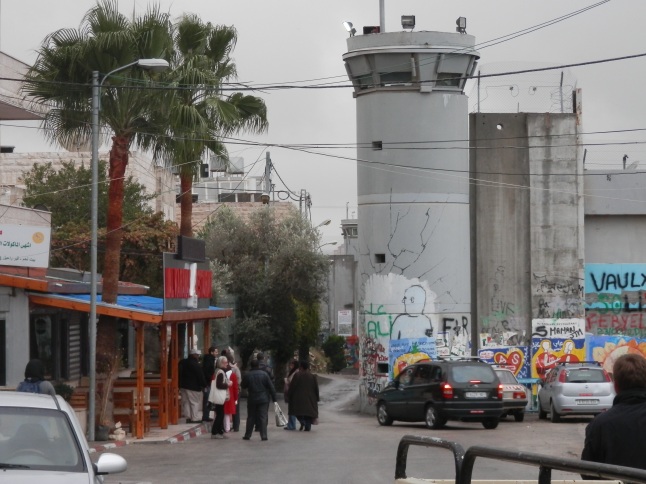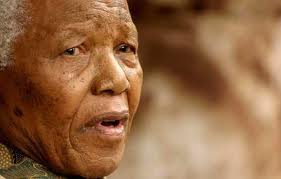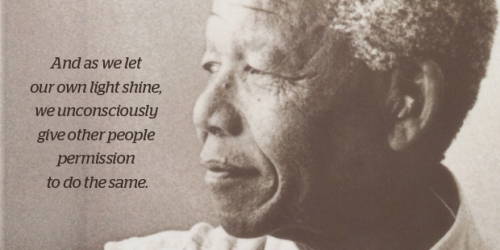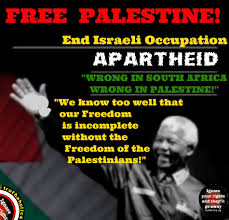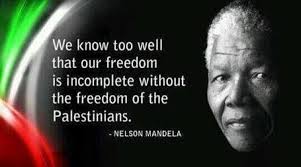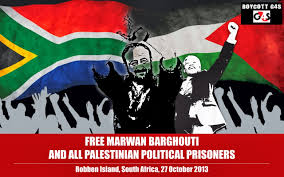
PREPARED FOR: Solidarity Conference in support of the People of Cuba, Western Sahara and Palestine: South African Parliament, Cape Town, 6 February 2014.
TOPIC: Palestine: Intensifying the struggle for self-determination and efforts to bring about a lasting solution to the Arab-Israeli conflict, by Marthie Momberg.
Introduction
Honourable Mr Magama, Members of the Portfolio Committee on International Relations and Cooperation, Members of the Diplomatic Corps, Chair, Distinguished Guests: Thank you for this opportunity to present the views of Kairos Southern Africa.
Kairos Southern Africa is an ecumenical voice on local and international issues of justice from within the broader Christian community. We are connected to Kairos movements worldwide that are all inspired by the liberation theology tabled in the 1985 South African Kairos document.[1] This includes Kairos Palestine and its declaration of steadfast faith, hope and love from within the suffering of Palestinians.[2]
Our Christian message is that we need to love our enemy. In the spirit of this message we want to overcome the dualism that enables separatism. We recognise the humanity of both the oppressor and the oppressed, and our actions are informed by our vision for a reconciled, just peace between Israel and Palestine. This does not mean that we are prepared to compromise our message of vigorously opposing injustice.
Just over a year ago, Kairos Southern Africa accompanied a group of senior clergy from South Africa to Palestine and Israel. On their return, they declared that it “felt like walking into another apartheid ambush”. The group included the heads of the Methodist and the Uniting Presbyterian Churches, the Secretary General of the Evangelical Alliance of South Africa, the Deputy Moderator of the Dutch Reformed Church, and a representative of the South African youth. I read from their media statement:
We affirm the right to security, self-determination and dignity for both the Palestinians and the Israelis. Real security is only possible through the exercise of justice. We are conscious how a literal reading of the Bible, one where the Israel of the Old Testament is confused with the State of Israel, can result in the oppression of people. We confirm that the crisis in the Holy Land is in essence not a religious conflict, but a political crisis brought about by the violation of international law. As South Africans we believe we have a moral obligation to speak up and to stand with the oppressed. We do not want to side against the Israelis, but we do want to uphold international law and fight against any form of injustice.”[3]
Today you will hear central themes from this message in our argument to support our request to the South African government.
Who are the people of Palestine?
- Before the declaration of the State of Israel in 1948, the land called Palestine was populated by several groups: descendants of Arab Muslims from the vast Arab/Islamic empire that dominated Palestine from the seventh century; Arab Christians who were the descendants of the world’s first Christians; and small indigenous Jewish communities that were remnants of Palestine’s ancient Jewish kingdom. These people were all Semites who lived together in harmony until the Western Jews began arriving in the late nineteenth century. Some of these Jews sought a safe haven, but some sought land to conquer.
- After the wars of 1948[4] and 1967, we call the following people Palestinians: the 4.4 million people in the occupied Palestinian territories (i.e. the Gaza Strip, the West Bank and East Jerusalem), the more than 6 million people who became refugees as a result of these wars and who are prohibited by Israel to return,[5] and the 1.4 million people who reside in Israel,[6] where more than 50 laws regulate their status at every level of life, relegating them to second-class citizens, based on ethnic and religious identity. Approximately three-quarters of the entire Palestinian population worldwide are refugees. All of them, Muslims and Christians alike, are our concern. The over half a million Israeli settlers in the occupied territories are not Palestinians, but illegal inhabitants in breach of international law[7] who nevertheless receive preferential treatment from Israel as the occupying force.
What do we mean by intensifying the struggle?
If showing solidarity with the oppressed means merely issuing declarations, we say it is not enough. If we as South Africans embrace the concept of Ubuntu, which emeritus Archbishop Desmond Tutu describes as part of our essential humanity as we participate and share in a network of interdependence and togetherness,[8] then we cannot confine ourselves to mere talk. We have to be much more actively involved.
Moreover, South Africans have a moral obligation to act, given our history of apartheid. Did the world not actively help to demolish our apartheid through boycotts, divestment and sanctions? Now the Palestinian Christians have asked the South African Christian community directly to act against Israel’s unjust regime.
What would constitute an appropriate response? Let us consider the options of a small entity occupied by a regional military super-power backed by the USA:
- Is violent resistance against the violence of occupation a viable option? In 1985, the Kairos Document of 1985 recognised the violence of apartheid as the primary violence which elicited violent resistance from the liberation movements. The Kairos Document then, as Kairos Southern Africa does now, does not advocate violence. Instead we strongly advocate vigorous non-violent resistance.[9] We agree with the views of the delegates at the Kairos for Global Justice conference[10] who declared that:
“[s]ilence is an opinion. Inaction is an action … failure to resist the Israeli government…makes us accomplices in crimes against humanity, such as the crimes of apartheid and persecution as described in international law”.
- What about negotiations? Israel claims that it wants peace and does enter into negotiations, but insofar as it does enter into negotiations, Israel does so in bad faith, as Israel continues, at the same time, to expand its settlements. Is there currently enough pressure to ensure that both sides will bring all parties to the table and honour international law and the outcomes of an agreement? We do not think so. The USA can hardly be seen as an honest and impartial broker in the peace talks between Israel and Palestine. Israel receives 25 per cent of the entire US foreign aid budget. Since 1976, Israel has remained the highest recipient of US foreign aid in the world.[11] Phyllis Bennis from the Institute for Policy Studies in the USA said that if the USA were serious about peace, it would tell Israel: “Stop building your settlements on Palestinian land.” Granted, the USA has made this request many times. If Israel continues to respond by refusing (as Israel has been doing all along), and if the USA is serious, it should then stop (1) funding to the State of Israel, and (2) protecting Israel in the United Nations. But the USA says and does none of this. The current negotiations are not bringing Palestine and Israel and the world closer to a viable peace.
- Finally what about the option of non-violent resistance in the form of boycotts, divestment and sanctions? This is indeed what the civil society of Palestine called for in 2005.[12]
As South Africans, we should understand the urgency and the importance of Palestine’s appeal in the light of our own history. During the darkest hours of South African apartheid, an ecumenical group of South African theologians called the deepening crisis a Kairos moment of truth. They highlighted the danger of using literal, fundamentalist Biblical interpretations to rationalise theologies of oppression and state power. Such a Kairos moment, one which is decisive in history, may pass us by if we do not act timeously.
We are now faced by yet another form of apartheid, this time by Israel. We should note that it is not considered apartheid in terms of what happened in South Africa, but is classified as a crime against humanity as defined by the Rome Statute of the International Criminal Court and as described by, for example, the Russell Tribunal and South Africa’s HSRC.[13] We do not carry the responsibility of all history. We are responsible for our times. In that sense this opportunity is unique, it is for us to see, understand, and act upon, through non-violent means.[14]
However, the non-violent option of boycotts, divestment and sanctions is not favoured by pro-Israeli supporters. They tell us the situation is “complex” and that a “balanced approach” is necessary, hoping to lock their opponents into endless discussions to paralyse them. Their arguments also suggest that the two sides of the story carry equal weight and should be treated accordingly. Nothing could be further from the truth. How can Israel say that it wants peace, and simultaneously declare the construction of more settlement units, continue to build its Wall on Palestinian land, and continue all its other atrocities? Zionists argue that the people of Israel are “God’s chosen people” and that the “Promised Land” (which includes Palestine) was given to the Jewish people by God. They do not distinguish between the Biblical entity and the modern nation-state. They choose to read religious texts in a literal, divisive way in their justification of Israel’s attempt to transform the transnational and extraterritorial Jewish identity into a national, ethnocratic identity where Jewish citizens have more rights than others to establish political and economic control over the land.[15] Like the South African theologians in 1985 who found the principles of love, inclusivity and pluralism in the Bible, rather than division, we reject fundamentalism and exclusivist interpretations of religious scriptures.
When one argues from the perspective of international law, the situation is actually very, very clear. Both Palestine and Israel need to adhere to international law, UN resolutions and other applicable legal rulings. Admittedly, there are periodically some incidents of illegal violence targeted at civilians by Palestinians, but these cannot be compared to Israel’s dedicated, discriminatory, systematic, systemic, institutionalised oppression of the Palestinians, which violates international law every single day and on multiple levels.[16]
The Israeli regime is in breach of legal aspects such as those belonging to the special regime of occupation, international human rights law,[17] international humanitarian law as specified in the four Geneva Conventions,[18] as well as various rulings by the International Court of Justice and resolutions by the United Nations’ Security Council.[19]
When South African apartheid violated human rights, the world quite rightly did not call for a “balanced approach” to the differences between the apartheid regime and the oppressed – the world condemned such practices unequivocally, as it should when human rights are violated in Israel/Palestine today.
Kairos Southern Africa’s views on self-determination
We also support the aspirations of Israelis and Palestinians for security and self-determination in line with what international law allows. With regard to Israel’s treatment of Palestinians, we want to highlight five points:
- All violence against all civilians, Palestinian or Israeli, must end.
- Israel, a country that calls itself a democracy, must stop its discrimination on the basis of race, religion or any other factor against its Arab citizens. Israel must be held accountable for its violations of human rights.
- The more than six million Palestinian refugees have a legal right to return. A resolution of this matter consistent with international law and equity is necessary.
- The Israeli occupation of the West Bank, the Gaza Strip, and East Jerusalem must end. Until such time as this occupation does end, Israel as the occupying power must protect the Palestinian civilian population, administer the territory for their benefit, as specified by international law, and stop confiscating Palestinian land and resources under the pretext of “security”, or for any other reason.
- The USA should not be the only broker in the peace negotiations and deals. In this respect the UN needs to meet its responsibilities.
Palestine has been under military occupation since 1967 – for 47 years. However the illegal confiscation of Palestinian land started through the actions of Jewish militia before the State of Israel was declared in 1948. Since 1948 Israel’s land confiscation continues until this day as indicated by this map:
Israel’s confiscation of Palestinian Land: 1946 to 2014
The illegal ways by which Israel occupies the Palestinian territories effectively diminishes the possibility of self-determination. We are appalled that Israel uses its occupying power to take more and more land from the Palestinians whilst simultaneously destroying Palestinian infrastructure and making living conditions unbearable for Palestinians.[20]
In Gaza, the situation has reached an inhumane level. The living conditions, the depletion of livelihoods, and the decline in services and infrastructure for education, healthcare and water/sanitation are dire as a result of deliberate destruction. Miko Peled, a Jewish Israeli who served in the Israeli Defence Force, argues that Israel’s assaults on Gaza are part of a continuous campaign that started more than six decades ago with the infamous Unit 101, led by the late Ariel Sharon.[21] It is one of the most densely populated areas on earth, it now doubles up as an open air prison, since Israel controls the air space, the coastline and all land entrances to this area. There is no escape. A one-ton Israeli bomb can destroy an entire city block – on the first day of the Operation Cast Lead in December 2008, Israel dropped 100 tons of bombs on Gaza.[22]
In East Jerusalem and in the West Bank, Israel routinely demolishes houses, water wells and cisterns, roads, schools, animal shelters and other infrastructure; Israel displaces whole communities without offering them alternatives; the majority of Palestinians may not maintain or upgrade their own infrastructure; Israel confiscates valuable agricultural land in order to continue its building of the illegal Israeli Wall and settlements, and the movement of Palestinians is restricted by means of a series of checkpoints.[23]Amongst the many examples of double standards are the different roads for Israelis and Palestinians, and differences in the allocation of water resources and access to electricity. There is a military court for West Bank Palestinians and a civilian court for Israeli settlers. In these military courts, Palestinian children as young as 12 years old can be prosecuted. Each year 500 to 700 children are prosecuted, commonly for throwing stones. They are frequently arrested and detained at night, and more than half of them are held in prisons in Israel where they are tortured, abused and denied the right to have a parent present. The proceedings are held in Hebrew, although the children speak Arabic. Over 99% end in conviction.[24]
In the Jordan Valley, the Bedouin communities’ water consumption is about a fifth of the minimum recommended by the World Health Organisation. Nearby, the birds are singing in the lush green gardens of the settlements with their swimming pools and healthy crops. “They are stealing our water,” a Palestinian community leader told me when I visited the region in 2011. “They plant flowers in the settlement and we don’t have water to drink. The Israeli politics is to move us – should I then live in the air?”The Jordan Valley is the area furthest removed from the Green Line boundary with Israel, and it contains valuable agricultural resources. Israel controls 87% of this land.[25]
In a village where the Israeli Defence Force routinely uses so-called military practices to harass unarmed villagers who have no criminal records or charges against them, a child told me: “Our minds are not with our teachers when there is [military] training happening.” Another said: “I started to cry when I arrived at my house after school and saw that it was demolished. We couldn’t remove anything from the house.”
“Our message to the world is to look at us as human beings” another community leader told me. “I am not a political person or a negotiator, but I need to feed my family. My message is for them to look at us as people who want our children to be educated. I now need to drive a 35-40 km detour each day when I take my children to school because they closed my gate. This means that our children are in the village while we are here and we cannot take care of them and their school work.”
Israel uses the pretext of “security” for its confiscation of land and its restrictions on where and when Palestinians may travel. Let me mention two examples that suggest another agenda:
- When I monitored human rights violations in the World Council of Churches’ EAPPI programme,[26] we repeatedly reported that agricultural land which was allegedly confiscated by the Israeli Defence Force for military or security reasons was later used to plant settlement crops.
- In September 2012, the Israeli Supreme Court rejected a petition challenging the Israeli authorities’ refusal to let five women from the Gaza Strip travel to the West Bank to complete their master’s degrees. The Israeli Supreme Court accepted the Israeli’s position that allowing the students to travel through Israeli territory would “undermine the ‘separation’ policy which is based on both security and political considerations.” In doing so, the court effectively approved restrictions on civilian travel between Gaza and the West Bank, even where no individual security concerns are raised.[27]
We need to ask ourselves whether the Israeli government’s and its supporters’ outrage at the escalation in BDS (boycotts, divestment and sanctions) actions against Israel is not perhaps hypocritical in view of Israel’s own restrictions on, and its oppression of, the Palestinians.
A lasting solution
Kairos Southern Africa recognises that even ending the occupation and adherence to international law by both Israel and Palestine on its own will by no means solve all the problems. The acts of an oppressor injure not only the oppressed, but the oppressor too, and the oppressor’s partners or allies. Some Christians in the United States, for example, recently confessed to the role their country played in both the Holocaust and in Israel-Palestine.[28] In South Africa we also have experience of how true this is.
At Kairos Southern Africa, we cooperate with South African, Palestinian and Israeli people who belong to the three Abrahamic religions (Judaism, Islam and Christianity) and who advocate for a just peace. These are people who share our values of inclusivity, pluralism and human dignity. We are not fighting people, we are fighting a system. We ask ourselves what will be necessary to ensure self-determination after occupation, and we want to be co-travellers with those who are willing to open themselves up to the Other, so that jointly we learn from one another, reconcile, and live a lasting peace.
Kairos South Africa’s request
Any attempt to remain neutral in this kind of conflict is both futile and immoral. Neutrality enables the status quo of oppression to continue. It is a way of giving tacit support to the oppressor. We are not taking sides against the Israeli people, but we unequivocally reject the Israeli regime’s treatment of Palestinians. We want international law to be upheld, and join the struggle for justice by advocating non-violent resistance against any form of injustice.
In line with this endeavour, we ask you to actively accompany the Palestinian people in their quest for liberation and to be their voice in the international arena – as our late President, Nelson Rolihlahla Mandela, said, “we know too well that our freedom is incomplete without the freedom of the Palestinians” and others in oppressive situations.[29]
The role of the South African government is unique in the world, given our country’s history of apartheid and the ways in which we overcame the institutionalised injustices of this system. In 2014 we celebrate our twentieth year as a democracy, and the United Nations has declared 2014 a year of solidarity with the Palestinian people. By not responding when we know about the injustices and human rights violations suffered by the Palestinian people, we will be allowing and enabling an act of omission. By responding insufficiently, we will prolong the suffering and the damage. This is our Kairos moment.
Kairos Southern Africa expresses a moral standpoint. We are witnessing a worsening situation. We see Israel using negotiations to prolong the pain, to intensify the occupation and to confiscate more resources. All of this must now stop. We want all the injustices to stop now, as we wanted for ourselves during our own struggle.
For this reason we request the following from our government:
- We want complete military, diplomatic and financial sanctions against Israel until it complies with all applicable UN resolutions and international law, and ends the occupation.
- In the global arena, we want our government to lobby for the financial and other support for the Palestinians for socio-economic development after the end of the occupation.
- We want our government to implement the above two requests and to table these request at both the African Union and the United Nations.
- We also call on all political parties in South Africa to clearly communicate their stance on the plight of the Palestinian people and to make their views known timeously in the build-up to the 2014 elections.
[1] The Kairos Document is a theological statement issued in 1985 by a group of black South African theologians based predominantly in the black township of Soweto, South Africa. The statement challenged the churches’ response to what the authors saw as the vicious policies of the Apartheid state under the State of Emergency declared on 21 July 1985. The Kairos Document evoked strong reaction both in South Africa, and world-wide. This example of contextual theology served as an example for critical writing at decisive moments in several other countries and contexts such as in Brazil, the USA, India, Palestine, etc.
[2] Kairos Palestine. 2009. A moment of truth: A word of faith, hope, and love from the heart of the Palestinian suffering. Jerusalem. [Online]. Available: http://www.kairospalestine.ps. [2011, 20 December].
[3] 8 December 2012, Jerusalem.
[4] With regard to 1948, there are two very different narratives: what Zionists call a War of Independence (“we fought bravely and won against all odds and by the grace of God”) is to Palestinians and supporters of human rights the Nakba (the Catastrophe).
[6] The population of Palestinians around the world totalled 11.6 million in 2012, according to the Palestinian Central Bureau of Statistics. [Online]. Ma’an News Agency. 2012. PCBS: Palestinian population reaches 11.6 million in 2012. [Online]. Available: http://www.maannews.net/eng/ViewDetails.aspx?ID=552362. [2014, 3 February].
[7] In 2011, the settler population was estimated at over 520,000; the annual average rate of growth during the past decade was 5.3% (excluding East Jerusalem), compared to 1.8% for the Israeli population as a whole (ICBS), according to the United Nations Office for the Coordination of Humanitarian Affairs (UNOCHA). 2012a. The Humanitarian Impact to Israeli Settlement Policies. [Online]. Available: http://www.ochaopt.org/ documents/ocha_opt_settlements_FactSheet_December_2012_english.pdf. [2014, 3 February].
All settlers in the occupied Palestinian territory “are illegal under international law as they violate Article 49 of the Fourth Geneva Convention, which prohibits the transfer of the occupying power’s civilian population into occupied territory. This illegality has been confirmed by the International Court of Justice, the High Contracting Parties to the Fourth Geneva Convention and the United Nations Security Council.” UNOCHA. 2012b. The Humanitarian Impact of Israeli Settlement Policies. January. [Online]. Available: http://www.ochaopt.org/documents/ocha_opt_settlements_FactSheet_January_2012_english.pdf. [2012, 23 September].
[8]Tutu, D. 2000. No Future without Forgiveness. London: Rider Books. (pp. 31, 166, 196).
[9] Although the use of arms against military targets is recognised as lawful under international law, as Bennis argues, we believe that the law only manages the conditions of war, whilst we want the war to stop. Bennis, P. 2012. Understanding the Palestinian-Israeli Conflict. A primer. Northampton: Olive Branch Press. (p..3).
[11] Kairos Palestine. 2011. The Bethlehem Call. (p.86).
[15] Rabkin, Y. 2010. Zionism a ‘terrible enemy’ of Jewish people. Cape Times, 10 March.
14 Braverman, M. 2010. Fatal Embrace. Christians, Jews, and the Search for Peace in the Holy Land. Austin, TX: Synergy Books. (p. 348);
Ecumenical Accompaniment Programme in Palestine and Israel (EAPPI). 2010. An Unjust Settlement. A Tale of Illegal Israeli Settlements in the West Bank. Jerusalem: Emerezian Est.;
Ecumenical Accompaniment Programme in Palestine and Israel (EAPPI). 2009. Silently Displaced in the West Bank. Jerusalem: Emerezian Est.;
Oxfam. 2012. On the Brink. Israeli settlements and their impact on Palestinians in the Jordan Valley. [Online]. Available: 160 Oxfam Briefing Paper. Available: http://www.oxfam.org/sites/www.oxfam.org/files/bp160-jordan-valley-settlements-050712-en_1.pdf. [2012, 1 August].;
Russell Tribunal on Palestine. 2011. Executive summary of the findings of the third session of the RToP. A systematic and institutionalised regime. [Online]. Available: http://www.russelltribunalonpalestine.com/en/ sessions/south-africa/south-africa-session-%E2%80%94-full-findings/cape-town-session-summary-of-findings. [2013, 21 September].;
United Nations Office for the Coordination of Humanitarian Affairs. 2012a. Demolitions and Forced Displacement in the Occupied West Bank. January. [Online]. Available: http://www.ochaopt.org/documents/ ocha_opt_demolitions_factSheet_january_2012_english.pdf. [2012, 2 February].;
United Nations Office for the Coordination of Humanitarian Affairs. 2012b. The Humanitarian Impact of Israeli Settlement Policies. January. [Online]. Available: http://www.ochaopt.org/documents/
ocha_opt_settlements_FactSheet_January_2012_english.pdf. [2012, 23 September].;
United Nations Office for the Coordination of Humanitarian Affairs. 2011. Israeli Settler Violence in the West Bank. November. [Online]. Available: http://www.ochaopt.org/documents/ocha_opt_settler_violence_ FactSheet_October_2011_english.pdf. [2012, 23 September].
[17] Protecting individuals in war and in peace.
[18] Covering civilians caught up in war and armed conflict areas.
[21] Peled, M. 2012. The General’s Son. Journey of an Israeli in Palestine. Charlottesville: Just World Books.
[23] Article 55 of the Hague Convention stipulates that “the occupying state shall be regarded only as administrator and usufructuary of public buildings, real estate, forests, and agricultural estates belonging to the hostile State, and situated in the occupied country. It must safeguard the capital of these properties, and administer them in accordance with the rules of usufruct” (EAPPI 2010:100). This stipulation is ignored, as is evident from Israel’s confiscation of land and water resources, the home demolitions and evictions, the harassment, violence, vandalism and incitement (EAPPI 2010:12-95), as well as from the illegal Israeli Wall and its associated regime, the many checkpoints and transport restrictions, and the discriminatory court system whereby illegal Israeli settlers have access to a civil court and indigenous Palestinians are put on trial in an Israeli military court (EAPPI 2009:24-79). Further evidence can be found in recent statistics on demolitions and forced displacements in the West Bank (UNOCHA 2012a).
[25] The Jordan Valley and Dead Sea area covers around 30% of the West Bank, and is home to nearly 60,000 Palestinians. Of this land, 87% is designated as Area C, virtually all of which Palestinians are prohibited to use, It is earmarked instead for the use of the Israeli military or under the jurisdiction of Israeli settlements. The permitted water consumption is 20 litres/capita/day in most herding communities in the area, compared to the WHO recommendation of 100 l/c/d, and the average settlement consumption of 300 l/c/d. UNOCHA. 2012c. Humanitarian Fact Sheet on the Jordan Valley and Dead Sea Area. [Online]. Available: http://www.unochaopt.org/documents/ocha_opt_jordan_valley_factSheet_february_2012_english.pdf. [2014, 18 January].
[26] I served in 2011 in the Ecumenical Accompaniment Programme in Palestine and Israel (EAPPI).
[27] UNOCHA. 2013. Fragmented Lives. Humanitarian Overview 2012. [Online]. Available: http://www.unochaopt.org/documents/ocha_opt_fragmented_lives_annual_report_2013_english_web.pdf. [2014, 4 February]. The petition was jointly filed in 2012 by an Israeli and a Palestinian human rights organization (Gisha and Al Mezan) on behalf of the affected women. Four of the women, who are now in their 40s, were forced to discontinue their studies in 2000, following the outbreak of the second Intifada and Israel’s subsequent revocation of travel permits for many Gazans between the Gaza Strip and the West Bank. All four women hold various positions in civil society organizations promoting democracy and women’s rights.
[29]Mandela, N. Address by President Nelson Mandela at the International Day of Solidarity with the Palestinian People. African National Congress website. [Online]. Available: http://www.anc.org.za/show.php?id=3384. [2014, 5 February].
Palestyne herdenk die Nakba (Die Katastrofe) in Jerusalem.
















































